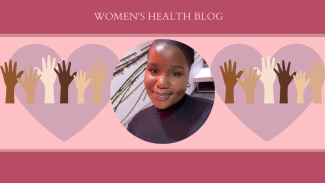Interviewee: Charity Mudhikwa, BSc Hons, MSc Student, Simon Fraser University Faculty of Health Sciences, Authors/Editors: Romina Garcia de leon, Shayda Swann (Blog Co-coordinators).
Published: June 9th, 2023
Could you tell us more about your research?
My research is sort of two-pronged. Firstly, it aims to examine the prevalence of perceived everyday racial discrimination among racialized women in British Columbia. Everyday racial discrimination refers to chronic, routine and relatively minor experiences of unequal treatment such as being followed around in stores and being treated with less courtesy because of your race. These experiences have been shown to be associated with poor health outcomes! And so, the second aim of my research is to evaluate the association between everyday racial discrimination and sexual health— particularly sexual pleasure.
I'll also be looking to see if HIV status modifies that association since my work is within the BCC3 cohort of women living with and without HIV. I think women living with HIV are generally more aware of their sexuality because of the conversations they have in healthcare settings and with their peers, so we may see differences when comparing women living with and without HIV.
Ultimately, I’m really interested in examining everyday racial discrimination, the tools used to measure it in health research, and the associations that it may have with sexual pleasure.
What motivated you to look at the intersection between racial discrimination and sexual pleasure in women?
As a racialized woman myself, I always knew what racism was and experienced it in different ways, but I began to understand it more when I moved to Canada because I grew up in Zimbabwe, where my race was not a significant part of my identity. Usually, when we think of racism we think of structural factors, like how racialized communities have lower socioeconomic status or blatant acts like racial slurs. But we don't think about more minor everyday experiences of racial discrimination, like not being treated well in restaurants. It seems very minute and inconsequential, but it’s cumulative and there is evidence that it does impact health. Also, racialized women are often seen as ‘deviant’ when it comes to sexual behaviour. What about looking at sexual health from a positive lens like pleasure? What about the racial discrimination that women experience? How may it affect women’s opportunities to experience pleasure?
What are some of your findings so far?
Racialized women, particularly Black and Indigenous women, are reporting significantly higher experiences of everyday racial discrimination compared to White women. When we compare by HIV status across specific groups, for example, Black women living or not living with HIV, there are no significant differences in everyday racial discrimination scores. So, we’re seeing that even after accounting for HIV status or socio-economic factors like income, education, and sexual orientation, racialized women are still experiencing very high levels of everyday racial discrimination. So, it warrants further investigation of how these experiences may be impacting priority health areas for women.
Who have been some of your mentors in the research field?
I'm very lucky to have had really inspirational and encouraging mentors throughout my academic journey. For my undergraduate honours project, I reached out to Dr. Bob Hogg, and he welcomed me with open arms, helped me figure out a project, and connected me with other mentors such as Dr. Kalysha Closson who has also been supportive. I was grateful to have people who believed in me and encouraged me to pursue opportunities that I otherwise would not have such as working to get my honours work published. Throughout grad school, my supervisor Dr. Angela Kaida has been very instrumental in my journey as a researcher and encourages me to explore the questions that I'm interested in. I think that’s rare, unfortunately, so having supportive people has been incredible. I don't think I'd be where I am without those mentors. I’m very grateful for them.
What impact do you hope to see with your research?
Firstly, especially in Canada, I would like to see the recognition that racial discrimination even exists in the first place. Going through the literature, I’ve realized just how much is lacking in a Canadian context. Some people in Canada genuinely deny the existence of racism or racial discrimination, or say ‘But it's not as bad as it is in the US.’ There's definitely a need for the Canadian general public to recognize that racism does exist and that it has serious implications for people's health. And it may have impacts on women's priority health areas such as sexual health and pleasure. So hopefully the impact that my work will have is to recognize the potential links between racial discrimination and sexual pleasure and to also inspire further research that considers the influence of everyday racial discrimination on other health outcomes.
Where can people find out more about the great work you do?
You can find out more about it on Twitter at @CharityMudhikwa or @HIV_HEAR_me. You can also find me on the BCC3 Study website.
